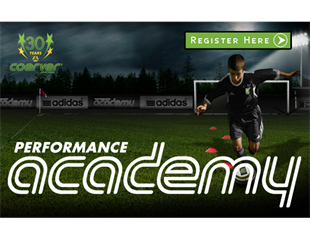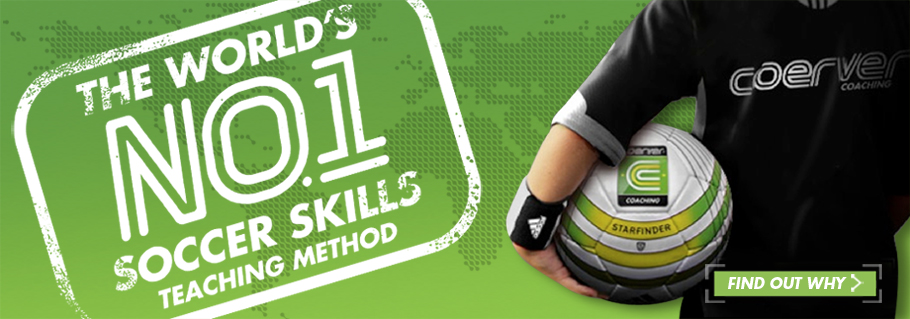Importance of Inspired Technical Training
Coerver San Diego’s Ryan Shera On Developing Youth Soccer Players & Their Love Of The Game
Youth Soccer News: What does player development in youth soccer really mean? Why is it taking America so long to develop world class players like Cristiano Ronaldo, Lionel Messi and even David Beckham, Andres Iniesta, Yaya Toure or Gareth Bale?
SoccerToday’s Diane Scavuzzo asked Director of Coerver San Diego, Ryan Shera why it is taking our country so long to produce a great player and what needs to change in youth soccer to let this happen. Perhaps it is going back to the basics of great technical training that is important – maybe youth soccer is still too focused on the win-at-all-cost mentality. Here is what Shera thinks about player development in youth soccer today and what really makes a difference on the field.
Diane Scavuzzo: What is the biggest problem with youth development in America?
Coerver San Diego’s Ryan Shera: There are several big problems with youth soccer in the USA. I’ll name a few…. Adult-centered, results-oriented youth setups; this results in meaningless games and tournaments, age-inappropriate field sizes, goals, and number of players, and of course, the promotion of bigger, faster, stronger players over skilful and smarter players.
Another problem in youth soccer in America is the lack of parent/coaching education specifically focused on youth development (5-14).
Finally, America has a developing, although still lacking, soccer culture. It will take more time for Americans to really embrace soccer and become immersed in a thriving soccer culture.
Diane Scavuzzo: What does Player Development mean to you? What type of environment is the best for successfully developing players?
Coerver San Diego’s Ryan Shera: Simply put, a challenging and joyful environment is best for developing players over the long-term. This type of environment really works.
What is important for successful player development? It is important to challenge players and build their confidence. The idea is to plant joy and cultivate passion; A very small percentage of players will play in college, even less will go pro, and even less will represent their national team.
Player Development means empowering youth players to take the game as far as they can and, regardless of their level – we want youth soccer players to love the game of soccer for a lifetime.
Diane Scavuzzo: What do you believe is the role of a youth soccer coach in the USA today?
Coerver San Diego’s Ryan Shera: Ideally, the role of the coach should be to instill joy and inspire creativity. A youth coach should not be focused on the final score nor concerned with ranking in youth soccer leagues or how many tournaments are won, but rather with fostering a life-long love affair with soccer. The role of a youth soccer coach is helping individual players reach their potential – their highest level possible.
I understand how difficult this is in the competitive club environment.
Diane Scavuzzo: Why do you think America has not been more successful so far at developing a homegrown Messi?
Coerver San Diego’s Ryan Shera: This is a huge question that probably requires a treatise to do it justice. But here’s a quick answer anyway. Do we, and by “we” I mean all constituents involved in US youth soccer (coaches, parents, clubs, players), take enough risk and have enough patience to develop world class players? Or are we stuck in a results-now environment, which inevitably promotes team-focused training over individual skill building, and bigger, faster, stronger over skilful and smart? Take chess for example. It takes time, patience, and risk to march a pawn down the board to become a queen.
We’re great a marshalling our pawns in the US. Youth coaches love pawns, they play simple/within themselves, they’re risk averse, they’re easy to organize and they follow orders. Organized pawns win and we sacrifice pawns (pigeon-hole players) to win games. Winning teams attract some knights, maybe a bishop. Rooks and knights play in college, maybe even on scholarship. Their youth coaches get accolades. But developing today’s youth soccer players into world-class players and difference makers? We lack the patience and foresight to cultivate a queen.
Diane Scavuzzo: How do youth soccer players become more confident?
Coerver San Diego’s Ryan Shera: The execution of skill under duress breads confidence. We teach the technique and introduce pressure. We encourage bravery.
Failing is merely an opportunity to learn.
That move/skill didn’t work that time – why? Okay, let’s go again. The why question often leads to the questions where and when. We ask questions and plant little seeds of thought. We applaud a player willing to try something spectacular, something audacious. Confidence stems from a certain capacity for risk.
Diane Scavuzzo: How important is speed? Strength?
Coerver San Diego’s Ryan Shera: Massively important, of course. Let’s be specific; speed of thought, reaction speed, fast footwork, change of pace, and acceleration after a move are important. These ‘skills’ are more important than simply running speed to a certain distance. Speed and strength must be applicable to the game. We strive to improve a player’s execution of skill at speed and under physical duress. Otherwise, a skill is merely a trick, nice — but not game-relevant.
Diane Scavuzzo: What is the difference with Coerver coaching – how specifically is the training different?
Coerver San Diego’s Ryan Shera: Coerver® Coaching unapologetically focuses on the individual. Coerver® training meets players where they are developmentally, regardless of their club team or role within their team, and improves their overall game.
Player development is achieved by focusing on technical fundamentals, tested through graduated pressure, and eventually performed under full-pressure 1v1s, 1v2s, 2v2s, and small sided games. No one else can provide the focus and detail we provide.
And, I believe no one else can provide our level of focus and detail while maintaining the challenge and joy we provide our players.
Players return to their club teams more skilful, more confident, and often with a new-found passion for the sport. Recently, at our Coerver® Spring Break Camps, parents expressed their gratitude for the challenges and the competition their child faced during the day camp. Parents were astonished when their players wanted to go to their team’s practice in the evening (after six hours of camp) to show off their new skills.
Diane Scavuzzo: What advantages does Coerver training provide to youth players? What is the best age to start this type of Coerver training?
Coerver San Diego’s Ryan Shera: Because Coerver® Coaching is removed from the youth soccer club environment, we can focus solely on the individual player and player development. Coerver® Coaching provides an unrelenting commitment to improving individual performance: quicker feet, stronger shielding, moves with purpose, ball mastery under duress, creative/abstract combination play, a skillful edge.
These are fundamental elements of the game at every level. This is why Coerver® Coaching works with youth players 5-18 and professional teams and national football federations. It’s never too early or too late to start. Our target age for Coerver® Coaching San Diego is 6-16.
Diane Scavuzzo: You are now working with youth soccer clubs – which clubs? What do you offer them? How are you helping their players?
Coerver San Diego’s Ryan Shera: Our programs are club-neutral. Our recent Spring Break Camps included players from over 15 different clubs. The players range from recreational level to premier level players at top clubs. All players improved.
 We offer a Club-Partner Program for clubs to take advantage of our resources, our attention to detail, our curriculum (31 years in development), and our unrelenting focus on individual improvement. Our Performance Academies and Team Trainings provide “The Perfect 3rd Practice”™ for club teams/players. That is, a player may train twice a week with his/her team in a team-focused practice, and train once a week with an individual-skills focused Coerver® Coaching session. Players benefit because they continually improve as individuals within their team environment. Clubs benefit because they develop talent from within (less recruiting) and retain talent because players are satisfied with their development.
We offer a Club-Partner Program for clubs to take advantage of our resources, our attention to detail, our curriculum (31 years in development), and our unrelenting focus on individual improvement. Our Performance Academies and Team Trainings provide “The Perfect 3rd Practice”™ for club teams/players. That is, a player may train twice a week with his/her team in a team-focused practice, and train once a week with an individual-skills focused Coerver® Coaching session. Players benefit because they continually improve as individuals within their team environment. Clubs benefit because they develop talent from within (less recruiting) and retain talent because players are satisfied with their development.
The curriculum in our many programs helps to develop creative, confident players by means of superior ball mastery and the ability to play at high speed with elite-level game smarts. It is total player development—Skill, Speed, Strength, Smarts and Spirit.
Diane Scavuzzo: Elite-level game smarts –what do these words means for a parent?
Coerver San Diego’s Ryan Shera: Great question. Elite-level game smarts are about abstract thinking and spacial awareness combined with speed of thought and purposeful actions.
Our progressions embed restrictions that require players to find solutions. The right solution brings success in the game and we make the games competitive. We provide guided discovery to help players find those solutions; we don’t force feed answers or command specific actions. Elite-level game smarts is a process, not a result or destination.
Diane Scavuzzo: When did you first start falling in love with soccer?
Coerver San Diego’s Ryan Shera: I came late to the sport. I saw my first Cruyff turn when I was a sophomore in high school! When I was a junior, Roy Dunshee became my high school coach and got me involved with Coerver® Coaching. My world changed. Exposure to Coerver® Coaching aided my skill development and stoked my passion for the sport. I pursued soccer relentlessly. I played pickup and soaked up everything I could from my Coerver® mentors. Two years later I was playing Division 1 college ball. That’s the magic of Coerver® Coaching. I wish I had been exposed to it when I was younger.
Diane Scavuzzo: When did you become involved with Coercer? Why?
Coerver San Diego’s Ryan Shera: I started with Coerver® Coaching in Maryland as a player then as a coach. I worked my way up the Coerver® ranks while in college, and then for about a year and a half after college. At that point I decided I needed a career, so I moved to San Diego, went to law school, and became a lawyer. After about four years of lawyering as a federal law clerk and as an attorney at San Diego’s largest firm, I decided it was a fine career but not my passion. I found out Coerver® Coaching San Diego was building its programs and I jumped on board. I take the same professional approach to soccer that I took to the practice of law: detailed, focused, organized. I’m thrilled to pursue my passion, and share that passion with San Diego’s youth players.







